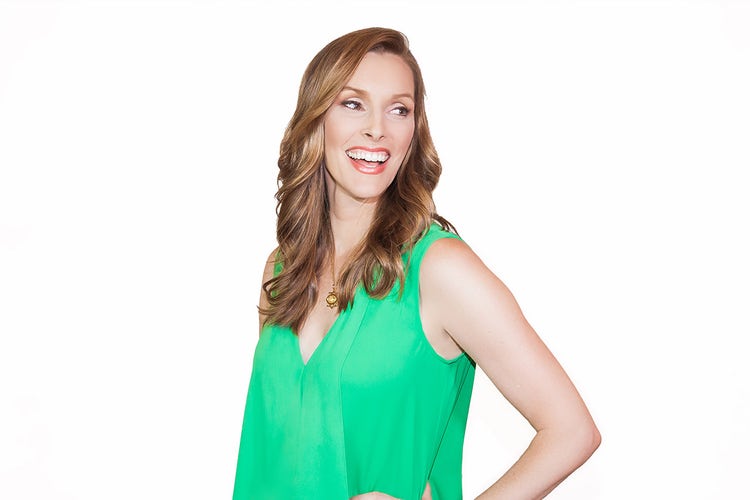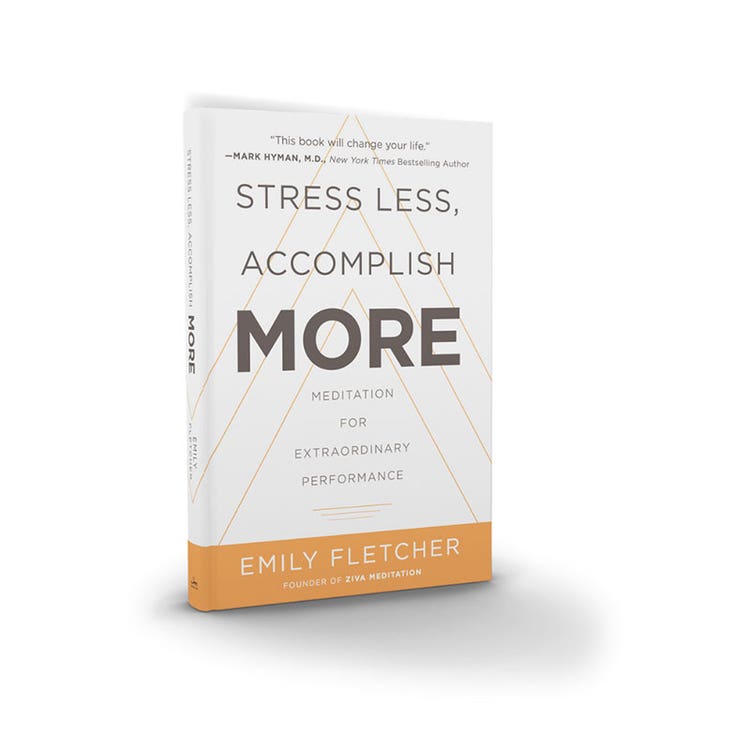A 30-Minute De-Stress Does More, With Emily Fletcher

No time. No space. No attention. Some skepticism whether meditation is all that it’s cracked up to be. Sound familiar? If you’ve heard about the benefits and even if you’ve read the research on the positive effects of meditation, you might be like the 39 million people who have downloaded one of the most popular meditation apps and stopped short of committing to a subscription.
Emily Fletcher wrote “Stress Less, Accomplish More” (William Morrow, 2019) just for you. She’s on a mission to re-brand meditation as the performance and productivity tool that it can be so that people can never use the excuse of not having time. Fletcher created the popular Ziva Technique for meditation, now practiced by thousands of students, including Oscar, Grammy, Emmy and Tony award winners, NBA players, Fortune 500 CEOs, busy parents and entrepreneurs. It’s a practice she teaches live and online, and now she has adapted it for readers as the Z Technique.
“If you define stress as what’s happening to you, it’s never going to go away,” Fletcher says. “There will always be demands. Life will always change. People will always die. There will always be traffic. What can change is your response to those demands.”
Still, Fletcher knows we need convincing, so “Stress Less, Accomplish More” makes the scientific case first. “Neuroscience is really catching up to what people have been saying for thousands of years: You don’t have to meditate but you can’t write it off anymore,” she says.
Fletcher also dispels myths and confusion that keep us from giving meditation a try or experiencing its benefits.

De-exciting the body
For one thing, exercise and sleep might not be enough to get the break from stress that our bodies need.
Fletcher cites the proverbial tiger in the bushes that prompts a fight-or-flight response and follows through to make the point that our coping mechanisms (even exercise) might be insufficient. “If you outrun or fight off the tiger, you immediately burn off the adrenaline and cortisol that starts pumping through your veins. This is why people say, ‘Exercise is my meditation.’”
“Exercise is great for you, but you’re exciting the nervous system,” Fletcher continues. “In meditation, you are de-exciting the nervous system. Exercise is good enough to handle your stress from today, but if I want to handle the dog that barked in my face when I was 10 or my parent’s divorce when I was 12, that stuff is stored in our cellular and epigenetic memory, and we have to give the body rest.”
Unlike the activities that we choose to relax, Fletcher points out that “meditation is a tool that is custom-designed to induce deep rest and usher you into a verifiable fourth state of consciousness that is different than waking, sleeping or dreaming. Cooking will not do that for you. Walking in the woods will not do that for you.”
Mindfulness vs. meditation

The Z Technique includes mindfulness and meditation. “Mindfulness is very good at dealing with your stress from today,” Fletcher explains. “Mindfulness is the art of bringing your awareness into the present moment, which is beautiful and powerful and necessary” when we ingest information all day.
“Meditation is all about giving your body deep, healing rest so that you can get rid of your stress from the past,” she continues. “Technique-wise, it’s more about surrendering and letting go than it is about focusing or concentrating on clearing the mind.” Although it’s stress that occurred in the past, our bodies—down to the cellular level—still respond to old triggers like that barking dog. Releasing that stress response facilitates healing and increases cognitive performance.
But most people, Fletcher says, are just practicing mindfulness, and that’s why they say they don’t have time to meditate. “They do 10 minutes of their mindfulness app and they feel OK, but it’s not the life-changing, performance-enhancing tool [they expected], and they’re not getting a return on their [time] investment.” (Thousands of Ziva students report that when they meditate, they’re getting back two to four hours of productivity a day for their 15-minute investment.)
Bliss vs. happiness

“Bliss is not a term that we use too much in the West,” Fletcher observes, and it’s often confused with happiness. “Happiness is one color on the rainbow spectrum of emotions. But bliss is a background [sense of] knowing, being; [it’s] this piece of you that knows that everything is OK.”
Despite our desire to be happy, Fletcher says, most of us are going through life with “guard rails” on our hearts. “We don’t want to get too excited,” she says. “We don’t want to get to a 10 because we’re terrified that we’ll drop down to a 1, so we’re just trying to live our life basically between a 4 and a 6. That’s not really a life.”
Fletcher has found a paradox: “When people start a meditation practice and they build up this background of bliss, they start to feel more intensely. They feel safe enough to really feel their feelings and feel them fully.”
Manifesting vs. dreaming

In addition to physical and emotional healing, the Z Technique includes a practice for manifesting. Fletcher distinguishes this from magical thinking. “Where a lot of us make the mistake is that we imagine our dreams in the future,” she explains. “That puts our attention on the desire for the dream, and the definition of stress is that space between where you are and where you think you should be.”
The key, Fletcher says, is imagining the dream as if it’s a current reality. “Once the dream is happening, you’re not so scared of it because you’ve already been there. You’ve already lived it in your imagination. And the cool thing with the brain is that it doesn’t know the difference between a real memory and an imagined one.”
She gets down to practicalities in summing up the benefits of meditation. “No one’s meditating for the sake of meditation,” she says. “Here is the science behind why it’s going to give you deeper sleep,” greater energy, productivity and more. So solid is the science behind meditation that Fletcher says just like exercise, you don’t have to do it, “but no one can make the argument that it’s not good for you.”
Video credit: Guille Fangold, Stocksy
Photo credit: Ziva Meditation; William Morrow; fizkes, Adobe Stock; maxpetrov, Adobe Stock; Elena Schweitzer, Adobe Stock